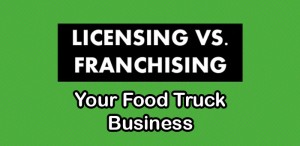The owner of every successful food truck is confronted with the decision to invest more capital and grow, or fall back on their success and stay a small business. With the risks and investments required to grow a food truck business, many vendors choose to stay small. Licensing and franchising are two ways food truck owners can rapidly grow their mobile food businesses while deferring many of the costs and risks to another party.
The differences between licensing and franchising are huge. To understand the difference between licensing and franchising we’ll look at what each term means.
Do you think you have a food truck concept that should or could be mentioned in the same conversation with McDonald’s, Subway or other successful food service franchises? Do you have a great food truck concept? If so, I’ll help you determine if you’re ready for food truck franchising.
Page Contents
Why Start A Food Truck Franchise?
So why would you want to franchise your food truck concept? Here are three reasons:
- Capital
- People
- Time
When it comes to growth, the big barrier for any in the food truck vendor has always been capital. Since the franchisee model provides the initial investment in the truck, growth can occur at a much lower cost.
As a franchisor, your investment in growth is largely limited to the development of your franchise documentation and franchise recruiting costs. And since in most cases it’s the franchisee that signs the truck and commissary leases and commits to various supplier contracts, you are able to grow with greatly reduced personal risk.
Another barrier facing many food truck owners is finding and retaining good food truck managers. Franchising allows the food truck owner to avoid this problem by filling the food truck manager slot with a highly motivated franchisee that has a stake in the business.
And for a final reason to franchise your food truck concept is that opening a new food truck in another city takes a lot of time.
Here are just some of the tasks that need to be repeated when you open trucks in multiple locations:
- Find a commissary
- Find parking locations
- Set up financing
- Recruit the staff
- Train staff
- Purchase the kitchen equipment
- Purchase the truck
- Get licensed
- Purchase inventory
- Etc, etc, etc…
The bottom line is the number of food trucks you can open across the country at any one time is limited. Franchising solves this problem because it’s the franchisee that does most of the heavy lifting. Thus, franchising not only provides a growing food truck brand financial leverage, but it allows for resource leverage as well.
Can You Franchise a Food Truck?

Have a unique food cart concept that could grow?
Almost any type of food truck can technically be franchised. But in order to actually sell franchises to investors, your food truck must be credible in the eyes of prospective franchisees. Ask yourself these 3 questions.
- Is it professionally designed?
- Is the concept unique?
- How hot is your concept?
The sizzle factor can be determined based on the number of unsolicited franchise inquiries you receive. If you’re regularly approached to franchise, there’s potential that your franchise will sell.
The next question to answer is: Can you reproduce everything in your food truck and are the operational processes and systems teachable? Again, the good news is that restaurant and food truck concepts have both been franchised before. There’s already a roadmap out there for documenting the process of operating a food truck.
Finally, let’s hit the big challenges: Profitability and growth. Your food truck concept will need to provide an adequate return to both you and your franchisee. This means, you will need to adjust the franchisee’s potential returns by deducting a royalty. If your franchisee can generate an adjusted 15% return on investment, then your concept may be a good candidate for food truck franchising.
Food Truck Franchise Opportunities
Several food trucks have successfully transitioned into franchises, expanding their brand and reach across various locations. One notable example is Cousins Maine Lobster, which gained national attention after appearing on “Shark Tank” and securing an investment from Barbara Corcoran. Here, we’ll explore a few examples of food trucks that have successfully franchised and discuss factors contributing to their success.
Cousins Maine Lobster became a big hit for a few simple but powerful reasons. First, they got on the TV show “Shark Tank,” which made a lot of people know about them really quickly. People saw them on TV and wanted to try their food.
Cousins Maine Lobster found huge success partly because lobster rolls, their signature dish, are a high-profit menu item. Selling for around $20 each, lobster rolls offer the potential for significant sales volume. This high price point is justified by the quality and novelty of the product, especially in locations where fresh lobster is a rarity. Despite the premium price, the demand remains high because of the perceived value and the unique dining experience it offers.
The concept of selling lobster rolls is perfectly suited for a small mobile food truck for several reasons. Firstly, the menu is focused and simple, which streamlines the cooking and serving process, allowing for quick service even in a cramped space. Secondly, the high ticket price of each roll means that the truck can achieve substantial revenue even with a relatively low volume of sales.
The Halal Guys is another street food concept that successfully franchised. They began with just one cart in New York and quickly won over customers with their tasty, well-priced halal food. They’ve been smart about growing their business, moving from just a cart to having actual restaurants and then letting other people open their own Halal Guys locations. No matter how much they grow, they always make sure their food tastes great and that customers are happy, which is a big reason why so many people keep coming back and the franchise has been successful.
The Process Of Food Truck Franchising
If you do make the decision to franchise your food truck concept, your must first address numerous issues confronting a new franchisor: speed of growth, territory development, support services, staffing, and fee structure, to name a few.
You will then need to develop a franchise contract, a franchise disclosure document (required by the FTC), and, depending on where franchises are being sold, state registrations or filings.

An optimized mobile kitchen.
Quality control generally translates into the development of an operations manual and well thought out training programs, if they are not in place already. Your manual should contain everything on how to open and operate your food truck, although there are certain protections that you may want to build in relative to the protection of recipes (use of spice packets, etc.). You will also include quality control checklists, policies, procedures, and tactics that will allow these systems to be uniformly enforced.
Finally, you will need to market and sell franchises. You will need to develop a plan for attracting prospects and the necessary materials (brochures, videotapes, etc.) that will help make the sale. Make sure you incorporate your food truck franchising message into your website. Since franchise sales are highly regulated, you will need to be educated in proper sales, disclosure, and compliance techniques.
As a franchisor, the first thing you will learn is that you have entered a completely different business. Your new role as a franchisor will be selling and servicing franchisees. The key to success in franchising is successful franchisees. And if you provide a system that allows you food truck franchises succeed, perhaps you will be part of that conversation about McDonald’s & Subway.
Costs to Start
Franchising a restaurant or food truck concept can involve significant financial investment, but the total cost can vary widely depending on the brand, location, and scale of operations. Here’s a breakdown of the potential costs involved in franchising a restaurant or food truck:
Initial Franchise Fee
- This one-time fee grants you the license to operate under the franchisor’s brand and business model. For food trucks and smaller restaurant chains, this fee can range from $10,000 to $50,000, but for well-established or premium restaurant brands, it can go up to $100,000 or more.
Startup Costs
- Food Trucks: The startup costs for a food truck franchise include the cost of the truck itself, kitchen equipment, initial inventory, and any required modifications. These costs can range from $50,000 to $200,000.
- Restaurants: Opening a restaurant franchise requires a larger upfront investment for real estate (purchase or lease), construction, kitchen equipment, furniture, and initial inventory. Depending on the size and location, startup costs can range from $250,000 to over $1 million.
Ongoing Fees
- Royalties: Franchisees typically pay a percentage of their weekly or monthly gross income as royalties to the franchisor. This rate can vary but often ranges from 4% to 8%.
- Marketing Fees: Additionally, franchisees may be required to contribute to a national or regional marketing fund, which can be about 2% to 4% of gross sales.
Additional Costs
- Training, legal fees, insurance, and working capital to cover operating expenses until the business becomes profitable are also important considerations. These costs can add tens of thousands of dollars to your initial investment.
It’s crucial to conduct thorough research and review the Franchise Disclosure Document (FDD) provided by the franchisor, which outlines all fees, obligations, and expectations. Additionally, speaking with current franchisees can offer valuable insights into the financial realities of running the franchise.
While franchising can be expensive, it also offers benefits like brand recognition, a proven business model, and support from the franchisor. Potential franchisees should carefully assess their financial resources, the franchisor’s track record, and their own business goals before committing to a franchise opportunity.
Defining Licensing and Franchising

What’s right for you?
Licensing
The essence of licensing is the vendor retaining ownership of its intellectual property (IP) while granting others the right to use it.
An example might be a food truck that has developed a successful menu item that another food truck owner is interested in selling off their menu. The only requirements might be that the licensee purchases specific ingredients and marketing items (boxes, bags, and cups with the licensor logo printed on them) through a designated distributor.
Whether you are licensing or franchising, the important thing is to protect your IP. Your food truck brand, know how, trademarks etc. are all precious assets, which should not be shared casually. The terms on which you grant licenses or franchises need to be carefully considered.
Franchising
Franchising is a way to scale a food truck business once it has become successful. It involves finding franchisees with the skills necessary to operate trucks that run identically as the original business. McDonald’s is probably the best example of a food business that has grown through franchising.
Under a franchise, the vendor (franchisor) retains control of the food truck’s brand and licenses the franchisee to use its successful food truck business model and brand. In exchange, the franchisee puts up the initial capital for the business, helps to promote the brand and pays a license fee. The franchisor supports its franchisees by providing training to recreate the menu, know how on operational systems and marketing.
Licensing of intellectual property (a food truck’s menu and operational systems) is basis of a franchise contract. So, technically, a franchise includes licensing. Typically, this will cover recipes and other confidential operational information, trademarks, logos and designs, and copyright materials.
An essential element of a franchise relates to the formalities involved in setting up the franchise, and the degree of control the franchisor retains. A franchise agreement will usually give the franchisor the ability to control how the business is run.
Licensing vs Franchising
Set-up
A licensing agreement can be completed in as little as a week. Before offering a franchise however, a vendor must have standardized food production and operational systems, marketing and distribution. Franchising vendors must also complete extensive legal documentation and draft franchising agreements before becoming a franchisor. Franchisees are also subjected to a lengthy and thorough selection process. Franchising usually takes longer and costs more to set up than licensing.
Control & Support
In a licensing agreement, the licensor usually does not retain much control over how the licensee may operate. Unless otherwise specified, licensees can use the licensed property in whichever way they choose. Over the life of the agreement, which also tends to not last as long as a franchising relationship, licensees operate virtually independent from their licensors. Licensors in turn provide little if any support to licensees. Franchisors on the other hand, maintain significant control over how a franchisee operates. How its intellectual property is used and how its products and services are delivered is often determined by the franchisor.
Exclusivity and Competition
Licensors can sometimes license their intellectual property to two or more organizations operating in the same geographic region or market forcing licensees to compete directly with one another. Franchisees however, normally grant an exclusive territory in which to operate. When coupled with the site-selection assistance provided by the franchisor, limits direct competition between franchisees.
Franchising is extremely expensive. Because of this, licensing can be a great way to start if you are interested in franchising your food truck business. Rather than diving straight into franchising with all the due diligence and formalities that it entails, you could start by finding a few licensees who are willing to license some or all of your food truck business.




